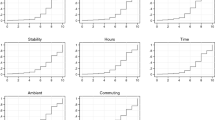Abstract
Two survey studies were conducted to assess the relationship of demographic variables to the experience of job burnout. Contrary to earlier hypotheses that women are more vulnerable to this form of job stress, the results show that women do slightly better than men. However, this difference is rather small, which suggests that the sex of the employee is not a major factor in burnout. Other results show that employees who were married or who had children experienced less burnout. Job category was also an important predictor. The findings are discussed in terms of sex-role socialization, sex-typed occupations, and social support systems.
Similar content being viewed by others
References
Caplan, G., & Killilea, M. (Ed.). Support systems and mutual help. New York: Grune & Stratton, 1976.
Cobb, S. Social support as a moderator of life stress. Psychosomatic Medicine 1976, 38 300–314.
Haw, M. A. Women, work and stress: A review and agenda for the future. Journal of Health and Social Behavior 1982, 23 132–144.
House, J. S. Work stress and social support. Reading, Mass.: Addison-Wesley, 1981.
Jackson, S. E., & Maslach, C. After-effects of job-related stress: Families as victims. Journal of Occupational Behaviour 1982, 3 63–77.
Kerlinger, F., & Pedhazur, E. Multiple regression in behavioral research. New York: Holt, 1973.
Lerner, M. J. The belief in a just world: A fundamental delusion. New York: Plenum, 1980.
Levine, G. I quit!: A guide to burnout prevention. Orange, Calif.: Indeco, 1981.
Maslach, C. Burnout: The cost of caring. Englewood Cliffs, N.J.: Prentice-Hall, 1982.
Maslach, C., & Jackson, S. E. The Maslach Burnout Inventory. Research edition. Palo Alto: Consulting Psychologists Press, 1981. (a)
Maslach, C., & Jackson, S. E. The measurement of experienced burnout. Journal of Occupational Behaviour 1981, 2 99–113. (b)
Maslach, C., & Jackson, S. E. Burnout in health professions: A social psychological analysis. In G. Sanders & J. Suls (Eds.), Social psychology of health and illness. Hillsdale, N.J.: Erlbaum, 1982. Pp. 227–251.
Maslach, C., & Jackson, S. E. Patterns of burnout among a national sample of public contact workers. Journal of Health and Human Resources Administration 1984, 7 189–212.
Pines, A. M., Aronson, E., & Kafry, D. Burnout: From tedium to personal growth. New York: Free Press, 1981.
Ryan, W. Blaming the victim. New York: Pantheon, 1971.
Ryerson, D., & Marks, N. Career burnout in the human services: Strategies for intervention. In J. W. Jones (Ed.), The burnout syndrome. Park Ridge, Ill.: London House Press, 1981. Pp. 151–164.
Schwab, R. L., & Iwanicki, E. F. Who are our burned out teachers? Educational Research Quarterly 1982, 7(2), 5–16.
Wills, T. A. Perceptions of clients by professional helpers. Psychological Bulletin 1978, 85 968–1000.
Author information
Authors and Affiliations
Additional information
The research described in this article was supported by a Ford Foundation grant to the Center for the Study, Education and Advancement of Women, University of California, Berkeley; and by Biomedical Sciences Support Grant 3-SO5-RR-07006-08S1.
Rights and permissions
About this article
Cite this article
Maslach, C., Jackson, S.E. The role of sex and family variables in burnout. Sex Roles 12, 837–851 (1985). https://doi.org/10.1007/BF00287876
Issue Date:
DOI: https://doi.org/10.1007/BF00287876




